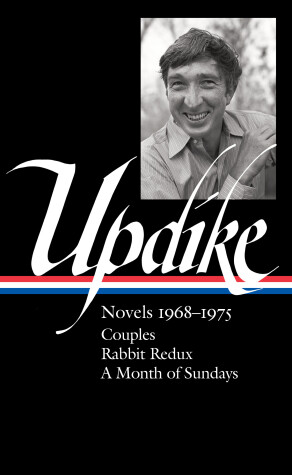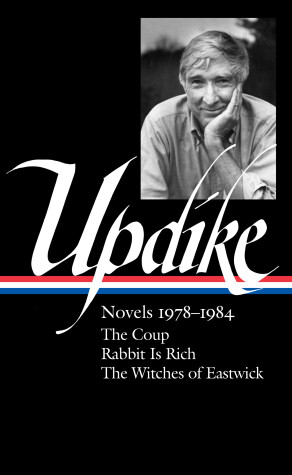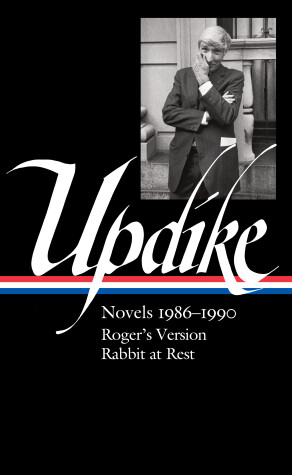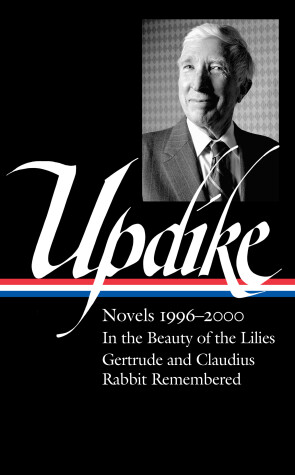Loa
4 primary works
Book 326
Library of America's definitive Updike edition continues with three masterful novels on the joys and the discontents of the sexual revolution
Here for the first time in one volume are three of John Updike's most essential novels--the scandalous Couples, the brilliant Rabbit Redux, and the uproarious A Month of Sundays--which together form an unforgettable triptych of the social turbulence that roiled America from the Kennedy to the Nixon years. Written with the grace, verve, and style of one of literature's most sophisticated entertainers, these books not only reveal Updike's genius in characterization and his formal versatility as a novelist but also delve into the complexities of sex and marriage, social class and personal morality, and the difficult quandaries of the flesh and the spirit. As a special feature the volume also presents two short pieces that shed light on the novels and the tale "Couples: A Short Story," the origin of the novel of the same name, written in 1963 but deemed unsuitable for publication by The New Yorker.
Here for the first time in one volume are three of John Updike's most essential novels--the scandalous Couples, the brilliant Rabbit Redux, and the uproarious A Month of Sundays--which together form an unforgettable triptych of the social turbulence that roiled America from the Kennedy to the Nixon years. Written with the grace, verve, and style of one of literature's most sophisticated entertainers, these books not only reveal Updike's genius in characterization and his formal versatility as a novelist but also delve into the complexities of sex and marriage, social class and personal morality, and the difficult quandaries of the flesh and the spirit. As a special feature the volume also presents two short pieces that shed light on the novels and the tale "Couples: A Short Story," the origin of the novel of the same name, written in 1963 but deemed unsuitable for publication by The New Yorker.
Book 339
The third volume of Library of America's five-volume edition of Updike's novels features the continuation of the renowned Rabbit saga and two wickedly funny satires set in the charged realms of sex, politics, and family.
The third volume in our five-volume selected edition of the novels of John Updike includes three books: The Coup, one of Updike's most outlandish satires, set in a fictional African nation; Rabbit Is Rich, the third, and many say best, novel starring his most famous protagonist; and the wildly popular The Witches of Eastwick, which was memorably adapted in the film starring Cher, Michelle Pfeiffer, Susan Sarandon, and Jack Nicholson. In The Coup, a surprising departure from his prior novels, Updike stages a withering take down of an array of targets, from American materialism and its baleful effects on the developing world to the follies of Cold War geopolitics and the fevered megalomania of the dictatorial mind. In Rabbit Is Rich, the third installment of the Rabbit tetralogy, we meet up with Harry Angstrom, now 46, dealing as best he can with the challenges and cares of midlife, a time when "you are carrying the world in a sense and yet it seems more out of control than ever." In The Witches of Eastwick, Updike imagines a small New England town possessed by magic--at least as practiced by the female trio at its center who, freed from the burdens of their marriages, make common cause and unleash their whimsical witchcraft on Eastwick's narrow-minded townspeople.
The third volume in our five-volume selected edition of the novels of John Updike includes three books: The Coup, one of Updike's most outlandish satires, set in a fictional African nation; Rabbit Is Rich, the third, and many say best, novel starring his most famous protagonist; and the wildly popular The Witches of Eastwick, which was memorably adapted in the film starring Cher, Michelle Pfeiffer, Susan Sarandon, and Jack Nicholson. In The Coup, a surprising departure from his prior novels, Updike stages a withering take down of an array of targets, from American materialism and its baleful effects on the developing world to the follies of Cold War geopolitics and the fevered megalomania of the dictatorial mind. In Rabbit Is Rich, the third installment of the Rabbit tetralogy, we meet up with Harry Angstrom, now 46, dealing as best he can with the challenges and cares of midlife, a time when "you are carrying the world in a sense and yet it seems more out of control than ever." In The Witches of Eastwick, Updike imagines a small New England town possessed by magic--at least as practiced by the female trio at its center who, freed from the burdens of their marriages, make common cause and unleash their whimsical witchcraft on Eastwick's narrow-minded townspeople.
Book 354
John Updike, at the peak of his powers, concludes his unforgettable Rabbit series and reimagines Hawthorne’s Scarlet Letter for contemporary America
The latest volume in Library of America’s John Updike edition presents two essential novels by the master stylist of postwar American fiction. Roger’s Version (1986) stakes out ground that encompasses Updike’s recurring themes of sex, desire, and adultery as well as an emerging interest in the cosmic implications of contemporary scientific breakthroughs. In a dazzling refashioning of the love triangle at the heart of Hawthorne’s The Scarlet Letter, twin adulteries unfold, revealing the heightened contrasts and inequalities of Ronald Reagan’s America.
Widely hailed upon publication as a masterpiece, awarded a Pulitzer and a National Book Critics Circle prize, Rabbit at Rest (1990) wraps up the saga of Updike’s most enduring protagonist and concludes his “surpassingly eloquent elegy for his country,” in the words of Joyce Carol Oates. Now in his mid-fifties, the outwardly comfortable and complacent Harry Angstrom has settled into leisured obsolescence, dividing his time between Pennsylvania and the Valhalla Village retirement community in Florida. But alongside his golfing, junk-food consumption, and other forms of ease there loom unavoidable markers of Rabbit’s human fragility and his mortality.
The latest volume in Library of America’s John Updike edition presents two essential novels by the master stylist of postwar American fiction. Roger’s Version (1986) stakes out ground that encompasses Updike’s recurring themes of sex, desire, and adultery as well as an emerging interest in the cosmic implications of contemporary scientific breakthroughs. In a dazzling refashioning of the love triangle at the heart of Hawthorne’s The Scarlet Letter, twin adulteries unfold, revealing the heightened contrasts and inequalities of Ronald Reagan’s America.
Widely hailed upon publication as a masterpiece, awarded a Pulitzer and a National Book Critics Circle prize, Rabbit at Rest (1990) wraps up the saga of Updike’s most enduring protagonist and concludes his “surpassingly eloquent elegy for his country,” in the words of Joyce Carol Oates. Now in his mid-fifties, the outwardly comfortable and complacent Harry Angstrom has settled into leisured obsolescence, dividing his time between Pennsylvania and the Valhalla Village retirement community in Florida. But alongside his golfing, junk-food consumption, and other forms of ease there loom unavoidable markers of Rabbit’s human fragility and his mortality.
Book 365
The Library of America's five-volume edition of Updike's novels culminates with three masterful late works: a brilliant exploration of the American Century; a reimagining of Shakespeare’s Hamlet; and a bittersweet coda to the Rabbit series
The capstone volume of the Library of America edition of John Updike’s novels contains some of the master stylist and social observer’s most ambitious works.
In the Beauty of the Lilies (1996) opens in 1910, when Clarence Wilmot, a Presbyterian minister in Paterson, NJ, experiences a devastating loss of faith. This moment of crisis sets in motion an eighty-year, multigenerational saga whose subject is nothing less than the American Century and modernity itself, seen through the fluctuating fortunes of a single representative family.
In Gertrude and Claudius, Updike boldly imagines the long backstory to the world’s most famous play, prompting readers to revisit and perhaps revise their judgments about Hamlet’s notorious uncle and mother. Drawing on the twelfth- and fifteenth century sources for Hamlet, but also inventing a new history for Claudius in his far-flung travels across medieval Europe, Updike creates a vivid and surprising origin story for the fabled rottenness in Shakespeare’s Denmark.
The novella Rabbit Remembered (2000) is a poignant final curtain call for one of the greatest characters in twentieth-century American literature. Once again the setting is Brewer, Pennsylvania, but now Harry Angstrom’s family are figuring out their lives in his absence. Harry’s ghost is insistently present, and the stories shared by his children suggest that the reckoning with those closest to us, for better and for worse, never really ends.
None of these books have ever been published in an annotated edition. This deluxe editions includes six rare pieces by Updike reflecting on the novels collected here.
The capstone volume of the Library of America edition of John Updike’s novels contains some of the master stylist and social observer’s most ambitious works.
In the Beauty of the Lilies (1996) opens in 1910, when Clarence Wilmot, a Presbyterian minister in Paterson, NJ, experiences a devastating loss of faith. This moment of crisis sets in motion an eighty-year, multigenerational saga whose subject is nothing less than the American Century and modernity itself, seen through the fluctuating fortunes of a single representative family.
In Gertrude and Claudius, Updike boldly imagines the long backstory to the world’s most famous play, prompting readers to revisit and perhaps revise their judgments about Hamlet’s notorious uncle and mother. Drawing on the twelfth- and fifteenth century sources for Hamlet, but also inventing a new history for Claudius in his far-flung travels across medieval Europe, Updike creates a vivid and surprising origin story for the fabled rottenness in Shakespeare’s Denmark.
The novella Rabbit Remembered (2000) is a poignant final curtain call for one of the greatest characters in twentieth-century American literature. Once again the setting is Brewer, Pennsylvania, but now Harry Angstrom’s family are figuring out their lives in his absence. Harry’s ghost is insistently present, and the stories shared by his children suggest that the reckoning with those closest to us, for better and for worse, never really ends.
None of these books have ever been published in an annotated edition. This deluxe editions includes six rare pieces by Updike reflecting on the novels collected here.



